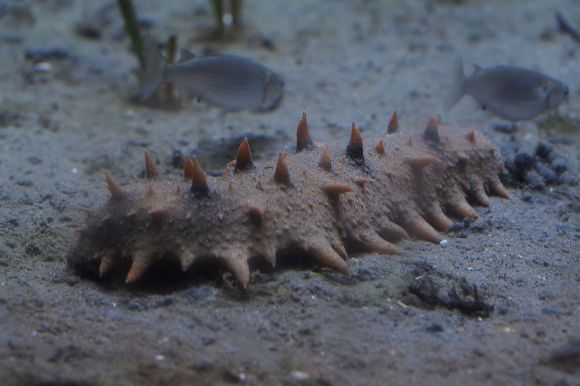
Who needs drugs, gambling, and prostitution when there’s an ocean full of slimy black gold for the taking?
It’s an increasingly common scene out on the Sea of Japan: in the middle of the night, Coast Guard patrols come across a suspicious ship that appears to be fishing, but whenever they approach the boat for questioning, the high-performance vessels take off at speeds they simply cannot match.
These ships are believed to belong to the yakuza, out on the sea in search of sea cucumbers again. This growing problem has caused the national government to begin to take measures to restrict the trade of these animals.
Currently, the penalty for poaching sea cucumbers is a maximum six months in prison and a 10,000 yen (US$91) fine. While that might be enough to keep away lone fishermen looking for some of that big-time sea cucumber money, it’s hardly enough to make a yakuza member flinch.
Last year, a Yamaguchi-gumi boss was sued for possession of 60 tons of sea cucumbers and ordered to pay 100 million yen ($912,000). More recently, five Yamaguchi-gumi members were arrested with 450 kilograms (1,000 pounds) of the creatures. Even still, such arrests are rare as the gangsters use ships faster than the authorities and even if caught, can simply dump the evidence back in the ocean.
According to a source close to organized crime who spoke with Shukan Bunshun, sea cucumbers are a major source of revenue for the yakuza right up there with amphetamine trafficking. This may come as a surprise to Japanese people who use sea cucumbers for little more than a pickled side dish.
▼ That, and there was a bit of a sea cucumber key-chain fad a few years ago
今からウォーキングしてきます。ちなみに私の携帯ストラップ!猫タルト、猫寿司、そして豊響からお土産で頂いたナマコ。ちなみにガラ携(笑)この歳でストラップはキモいのは解るけど猫が好き!家で飼えないから我慢している(泣)#sumo pic.twitter.com/ogMtLkAYG4
— 二子山雅高(元大関雅山) (@futagoyama_sumo) May 19, 2015
Actually, the bulk of sea cucumber profits comes from abroad. It is said to be a 20 billion yen ($182M) marine export behind only pearls and scallops in terms of revenue. This is thanks to a recent spike in demand in China causing prices to skyrocket to tens of thousands of yen per kilogram (roughly hundreds of dollars per pound) for dried sea cucumber.
The deal is made sweeter by the fact that sea cucumbers aren’t regulated like other forms of seafood. For example, bluefin tuna cannot be exported unless its source is verified by a regional fishing industry association. Now, in response to the current poaching sprees, the government is considering similar rules for sea cucumbers as well.
Until then, these noble echinoderms must continue to endure this reckless overfishing of the mob. They aren’t the only victims either. Perhaps some sympathy should be given to those yakuza members doing all the grunt-work too.
They probably joined up with dreams of hanging out in seedy bars and getting into street fights, only to end up scooting around the ocean in the dark, looking for living sausages at the bottom of the ocean, and thinking, “I learned Photoshop for this?!”
Source: Shukan Bunshun
Top image: Wikipedia/harum.koh

 10 yakuza members arrested for stealing sea cucumbers from ocean
10 yakuza members arrested for stealing sea cucumbers from ocean Ocean’s 11: heist of over 2M yen in sea cucumbers thwarted by Japanese coast guard
Ocean’s 11: heist of over 2M yen in sea cucumbers thwarted by Japanese coast guard Entire crew of Going Merry arrested by police in Japan (no, not on April 1)
Entire crew of Going Merry arrested by police in Japan (no, not on April 1) Trick or Trafficking? Japanese mafia hand out candy to kids on Halloween, get away with it again
Trick or Trafficking? Japanese mafia hand out candy to kids on Halloween, get away with it again Yakuza bosses struggling to upgrade phones from 3G
Yakuza bosses struggling to upgrade phones from 3G McDonald’s new Happy Meals offer up cute and practical Sanrio lifestyle goods
McDonald’s new Happy Meals offer up cute and practical Sanrio lifestyle goods Studio Ghibli glasses cases let anime characters keep an eye on your spectacles
Studio Ghibli glasses cases let anime characters keep an eye on your spectacles All-you-can-drink Starbucks and amazing views part of Tokyo’s new 170 meter-high sky lounge
All-you-can-drink Starbucks and amazing views part of Tokyo’s new 170 meter-high sky lounge Super Nintendo World expansion gets delayed for several months at Universal Studios Japan
Super Nintendo World expansion gets delayed for several months at Universal Studios Japan Studio Ghibli releases new action figures featuring Nausicaä of the Valley of the Wind characters
Studio Ghibli releases new action figures featuring Nausicaä of the Valley of the Wind characters McDonald’s Japan releases a pancake pie for new retro kissaten coffeeshop series
McDonald’s Japan releases a pancake pie for new retro kissaten coffeeshop series Kyoto’s 100 Demons yokai monster parade returns!
Kyoto’s 100 Demons yokai monster parade returns! We try out “Chan Ramen”, an underground type of ramen popular in the ramen community
We try out “Chan Ramen”, an underground type of ramen popular in the ramen community More foreign tourists than ever before in history visited Japan last month
More foreign tourists than ever before in history visited Japan last month Completely unmanned 24-hours clothing store found in Tokyo
Completely unmanned 24-hours clothing store found in Tokyo Disney princesses get official manga makeovers for Manga Princess Cafe opening in Tokyo
Disney princesses get official manga makeovers for Manga Princess Cafe opening in Tokyo Starbucks reopens at Shibuya Scramble Crossing with new look and design concept
Starbucks reopens at Shibuya Scramble Crossing with new look and design concept Beautiful new Final Fantasy T-shirt collection on the way from Uniqlo【Photos】
Beautiful new Final Fantasy T-shirt collection on the way from Uniqlo【Photos】 Is the new Shinkansen Train Desk ticket worth it?
Is the new Shinkansen Train Desk ticket worth it? Foreign English teachers in Japan pick their favorite Japanese-language phrases【Survey】
Foreign English teachers in Japan pick their favorite Japanese-language phrases【Survey】 Beautiful Sailor Moon manhole cover coasters being given out for free by Tokyo tourist center
Beautiful Sailor Moon manhole cover coasters being given out for free by Tokyo tourist center Studio Ghibli releases Kiki’s Delivery Service chocolate cake pouches in Japan
Studio Ghibli releases Kiki’s Delivery Service chocolate cake pouches in Japan Japan’s bone-breaking and record-breaking roller coaster is permanently shutting down
Japan’s bone-breaking and record-breaking roller coaster is permanently shutting down New definition of “Japanese whiskey” goes into effect to prevent fakes from fooling overseas buyers
New definition of “Japanese whiskey” goes into effect to prevent fakes from fooling overseas buyers Our Japanese reporter visits Costco in the U.S., finds super American and very Japanese things
Our Japanese reporter visits Costco in the U.S., finds super American and very Japanese things Studio Ghibli unveils Mother’s Day gift set that captures the love in My Neighbour Totoro
Studio Ghibli unveils Mother’s Day gift set that captures the love in My Neighbour Totoro Domino’s Japan now sells…pizza ears?
Domino’s Japan now sells…pizza ears? New Japanese KitKat flavour stars Sanrio characters, including Hello Kitty
New Japanese KitKat flavour stars Sanrio characters, including Hello Kitty One of Tokyo’s most famous meeting-spot landmarks is closing for good
One of Tokyo’s most famous meeting-spot landmarks is closing for good Kyoto creates new for-tourist buses to address overtourism with higher prices, faster rides
Kyoto creates new for-tourist buses to address overtourism with higher prices, faster rides Sales of Japan’s most convenient train ticket/shopping payment cards suspended indefinitely
Sales of Japan’s most convenient train ticket/shopping payment cards suspended indefinitely Sold-out Studio Ghibli desktop humidifiers are back so Totoro can help you through the dry season
Sold-out Studio Ghibli desktop humidifiers are back so Totoro can help you through the dry season Japanese government to make first change to romanization spelling rules since the 1950s
Japanese government to make first change to romanization spelling rules since the 1950s Ghibli founders Toshio Suzuki and Hayao Miyazaki contribute to Japanese whisky Totoro label design
Ghibli founders Toshio Suzuki and Hayao Miyazaki contribute to Japanese whisky Totoro label design Doraemon found buried at sea as scene from 1993 anime becomes real life【Photos】
Doraemon found buried at sea as scene from 1993 anime becomes real life【Photos】 Tokyo’s most famous Starbucks is closed
Tokyo’s most famous Starbucks is closed One Piece characters’ nationalities revealed, but fans have mixed opinions
One Piece characters’ nationalities revealed, but fans have mixed opinions We asked a Uniqlo employee what four things we should buy and their suggestions didn’t disappoint
We asked a Uniqlo employee what four things we should buy and their suggestions didn’t disappoint Princesses, fruits, and blacksmiths: Study reveals the 30 most unusual family names in Japan
Princesses, fruits, and blacksmiths: Study reveals the 30 most unusual family names in Japan Yakuza member arrested for not picking up dog poop
Yakuza member arrested for not picking up dog poop Happy Halloween from Japan’s largest criminal organization!
Happy Halloween from Japan’s largest criminal organization! Yakuza may be blocked from using all expressways in Japan within the decade
Yakuza may be blocked from using all expressways in Japan within the decade Our Japanese team discover “the most delicious way in the universe” to eat cucumber
Our Japanese team discover “the most delicious way in the universe” to eat cucumber Marine creature-themed tea bags transform teapots into aromatic oceans
Marine creature-themed tea bags transform teapots into aromatic oceans Tokyo’s first sushi cake specialty store opens in Japan
Tokyo’s first sushi cake specialty store opens in Japan Creepy or cute? Come face to face with deep sea creatures as gachapon sushi toys!!
Creepy or cute? Come face to face with deep sea creatures as gachapon sushi toys!! The greatest sushi roll in Japanese history is actually nine sushi rolls in one【Photos】
The greatest sushi roll in Japanese history is actually nine sushi rolls in one【Photos】 Member of yakuza arrested for having honest job, dishonest application
Member of yakuza arrested for having honest job, dishonest application Couriers scare off yakuza members pretending to be yakuza members
Couriers scare off yakuza members pretending to be yakuza members 23-year-old Tokyo policewoman falls in movie-style love with yakuza member, real life ensues
23-year-old Tokyo policewoman falls in movie-style love with yakuza member, real life ensues High-level yakuza member arrested for possession of 17kg of salt
High-level yakuza member arrested for possession of 17kg of salt Taxi driver’s tip to stay safe: “The one thing you should say if you run into yakuza”
Taxi driver’s tip to stay safe: “The one thing you should say if you run into yakuza” Take a Korean vacation in Japan with Tokyu Hotels and Shibuya 109’s newest themed hotel plan
Take a Korean vacation in Japan with Tokyu Hotels and Shibuya 109’s newest themed hotel plan Disney characters dress up as Bearbricks for Halloween, results range from cute to disturbing
Disney characters dress up as Bearbricks for Halloween, results range from cute to disturbing
Leave a Reply